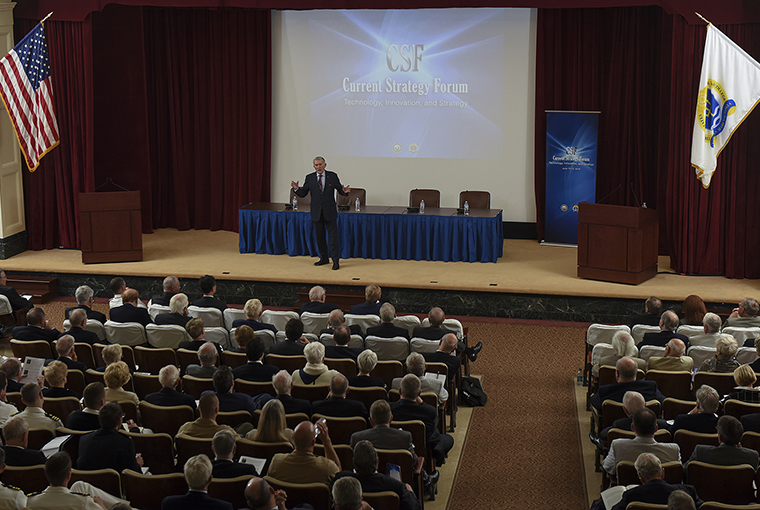Technology, Innovation and Strategy, Focuses of Naval War College Forum

NEWPORT, R.I. - U.S. Naval War College (NWC) hosted the 69th Current Strategy Forum (CSF) this week bringing together national security experts from the military, academics, government and private industry to explore wide-ranging issues of national and international importance.
CSF is the annual capstone event for the NWC academic year, and this year's theme, "Technology, Innovation and Strategy" focused on defining and understanding the ends and ways in a fast-changing and complex strategic environment in an era of rapid technological change, as well as discussing the means in the face of resource constraints.
The two-day forum, hosted by Secretary of the Navy Richard V. Spencer and co-hosted by Rear Adm. Jeffrey A. Harley, NWC's president, enabled the participants to discuss the future strategy of the United States in making sure our forces are prepared for the coming challenges presented by the proliferation of new, more capable, less expensive military capabilities.
Harley kicked off the event with welcome remarks and introduced keynote speaker Adm. John Richardson, chief of naval operations on Tuesday morning.
"We are a global Navy and we have global responsibilities," said Richardson. "As we think about the globe, we just wanted to highlight the strategic environment and particularly talk about things that we might have predicted would have changed when we issued our operational design two years ago and how that has played out over the last two years."
The decades-old event remains vital for decision makers who want to understand the national security strategic environment. Naval War College students were the focal point of much of the discussion because they are our next generation of decision makers.
"My priorities are simple," said Spencer. "People, capabilities, and process. Sometimes it sounds trite when we say people are the obvious, most important asset we have, but it's not trite. All we have in the Navy, in the Marine Corps, is cold steel or aluminum that without the human interface, do not meet half the capabilities that these platforms have. We need our people, our Sailors, our Marines, our leaders across the board to be engaged in our service."
Additional keynote speakers over the two days were Gen. Robert Neller, commandant, U.S. Marine Corps; Honorable John F. Lehman, former Secretary of the Navy, 1981-1987; Andrew F. Krepineich, Jr., president and chief operating officer of Solarium LLC; and Kiron K. Skinner, Taube Professor of International Relations and Politics at Carnegie Mellon University.
Three panel discussions, "Innovation and Great Power Competition - A Historical Perspective," "Innovation and Strategy," and "Technology and Innovation," were also held over the course of the forum.
NWC is a one-year resident program that graduates about 600 resident students and about 1,000 distance learning students each year. Its primary mission is to educate and develop future leaders. Additional missions include: helping to define the future Navy and its roles and missions, supporting combat readiness, strengthening global maritime partnerships, promoting ethics and leadership throughout the force, contributing knowledge to shape effective decisions through our Maritime History Center, providing expertise and advice to the international legal community through the Stockton Center for the Study of International Law. Students earn Joint Professional Military Education (JPME) credit and either a diploma or a master's degree in National Security and Strategic Studies or Defense and Strategic Studies. Established in 1884, U.S. Naval War College is the oldest institution of its kind in the world. More than 50,000 students have graduated since its first class of nine students in 1885 and about 300 of today's active duty admirals, generals and senior executive service leaders are alumni.
